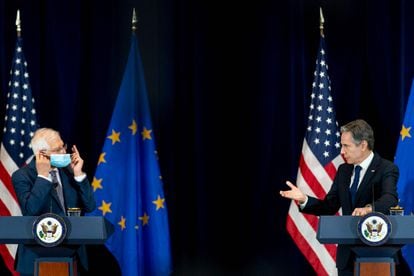Antony Blinken (right) addresses Josep Borrell during a joint press conference at the State Department in Washington on Monday. ANDREW HARNIK (AFP)
The high representative of the European Union for Foreign Policy, Josep Borrell, gave this Tuesday a boost to the French president, Emmanuel Macron, after the fiasco of his meeting with Vladimir Putin in Moscow the day before.
“President Macron's visit to Moscow has been important, but it has not produced a miracle.
The proof that the situation is still tense is that Russia has decided to send [half a dozen] warships to the Black Sea [for military exercises].
All in all, the trip has had positive effects due to his commitment to the path of negotiation to get out of the crisis”, Borrell pointed out in a meeting with journalists in Washington at the headquarters of the European Union Delegation.
Borrell has appeared together with the European Commissioner for Energy, Kadri Simson,
Macron met with Putin for five hours on Monday.
At night, Elysee sources explained that the French leader had extracted from the Russian the promise that Russia "will not undertake new military initiatives."
The Kremlin denied it this Tuesday with a disavowal as the icing, arguing that Paris would not be the correct interlocutor for it because it does not even lead NATO.
“Negotiations are still possible as long as there are people willing to come to the table and talk.
I see that there is still hope of not entering into a military confrontation.
And this gives a lot of importance to President [Emmanuel] Macron's visit to Russia.
It is reassuring to know that the Council Presidency assumes an important role in a situation like this.
Remember 2008, when Russia attacked Georgia and it was [then French President Nicolas] Sarkozy who played a similar role by immediately approaching Russia and starting to talk,” added Borrell.
During a talk organized hours earlier at the French Embassy in Washington, where he has spent two days of meetings, he said: "A European leader was needed to go, and France holds the presidency of the Council."
Borrell himself experienced first-hand the
surprises
that Moscow may have in store for European visits.
Last year, the Kremlin received it with the expulsion of three diplomats accused of participating in the protests in support of Alexei Navalni and, at a press conference, the Foreign Minister, Sergei Lavrov, took the opportunity to accuse the EU of "arrogance" .
Borrell has lowered this Tuesday the risk of a serious refugee crisis as a result of the Ukraine crisis.
And he recalled that the Ukrainians benefit from a special visa-free regime in the member countries and, above all, he stressed that he does not fear a "total war", that is, that Russia is going to "invade all of Ukraine, at World War II style.
The head of European diplomacy warned the day before, as he had done previously, that Russian military pressure on the Ukrainian border, where it has deployed more than 100,000 soldiers, has created "the most dangerous moment for European security since the end of the Cold War”.
Even so, Borrell ruled out such a serious armed conflict and pointed out that the Ukrainian government itself has asked the Western allies to tone down the crisis because it could end up damaging the country's image.
Borrell and Simson discussed in Washington with the Secretary of State, Antony Blinken, and the Secretary of Energy, Jennifer Granholm, the threat that a possible Russian invasion of Ukraine could pose to the supply of gas to the EU.
Simson wanted to send a message of calm.
“We are better prepared for something like this than we were a decade ago.
During this time we have invested a lot and have diversified our sources of supply of liquefied natural gas.
We have also spent money to improve the system of interconnectors, so that the gas that reaches a member state is easily transportable to others", he said, before stressing that the flow from distributors such as "Norway, Azerbaijan, the North Africa and Qatar.
He also highlighted that EU imports of liquefied natural gas from the United States have grown substantially since the first shipment in 2016. In 2021, they reached 22 billion cubic meters.
In the month of January alone, the EU received 4.4 billion cubic meters through this channel.
Subscribe here to the EL PAÍS América
newsletter
and receive all the key information on current affairs in the region.

